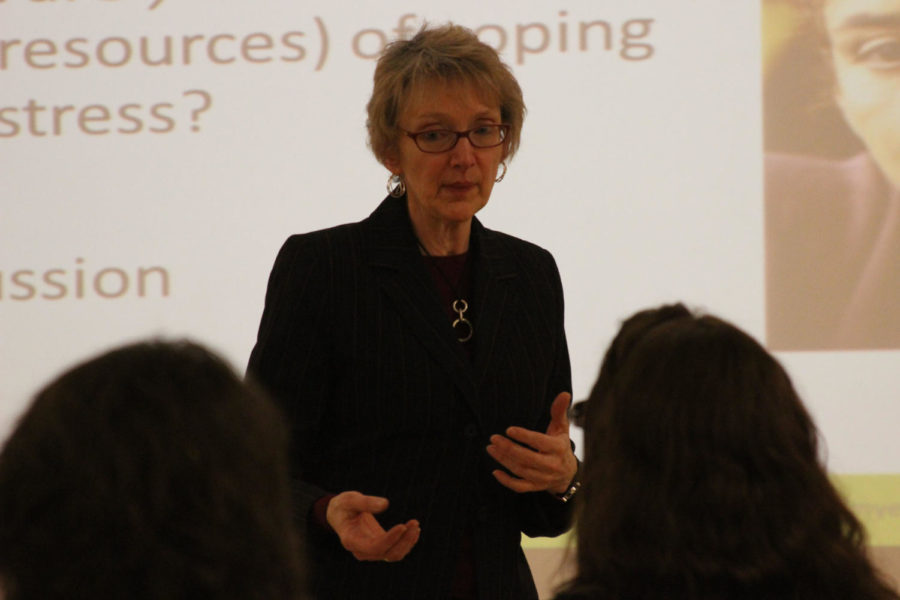Consultant discusses coping strategies for stress
By Logan Kahler, [email protected]
Jul Bruns, workplace services consultant, lead a presentation on how to rekindle passion April 28 in the Memorial Union Gallery.
April 29, 2014
Amid the stress of the finals and final assignments, solutions to at least one kind of stress — compassion fatigue stress — were discussed at a workshop.
Compassion fatigue stress is the stress experienced by those who absorb some of the emotional and mental distress others experience. Those carrying the emotional turmoil for others often experience constant feelings of stress, anxiety, hopelessness and a pessimistic attitude.
Jul Bruns, presenter and consultant for the Des Moines based company Employee and Family Resources, said the term compassion fatigue stress was coined during WWII when nurses were overwhelmed caring for the many injured soldiers.
“They were realizing that taking care of other people and people who are in pain will affect us,” Bruns said. “The nurses were crabby or they were bummed out, and then they felt bad. They felt guilty because they should be caring for these people. How can you not take that home with you? ”
Bruns said the nurses were able to cope with their compassion fatigue stress by understanding that it was acceptable [not] for them to be personally affected after absorbing the emotional and mental pain of the soldiers.
Bruns made it clear in the workshop that those coping with life-altering issues are not the only ones who can experience compassion fatigue stress.
Jerilyn Rasmusson, who attended the event and is the caregiver of her parents, said a coworker recommended she attend because of her caregiving position and the fact that she deals with a lot of emotional stress in her job as a human resource specialist for the university.
“It’s not just as a caregiver,” Rasmusson said about compassion fatigue. “It’s also in the workplace that you can have it. It’s everyday life. You’re being pulled in so many different directions and everything is a priority. You have to prioritize your priorities, so you’re always being pulled.”
Bruns said it is important for those with compassion fatigue — who are experiencing the emotional pains of those they help — to recognize when they reach their personal breaking points, or “red zones.” She said the first step in coping was to recognize that they had compassion fatigue distress.
“Can I adjust my behavior? Can I adjust my resources? What do I have to do — if it’s a red — to get into the pink,” Bruns said about coping techniques.
Bruns said it is extremely important for people to remember that they must take time to properly care for themselves, but there are techniques to make scheduling that time easier for the people who think of personal time as just another task on their agenda.
“I’ve done stress management classes where people almost get angry because they think, ‘I gotta do one more thing?’” Bruns said. “If you don’t counteract compassion fatigue with taking care of yourself, you’re going to get sick. Who do you care about in your life? You can’t be there for them if you don’t take care of yourself.”
Bruns said that a common symptom of overwhelming compassion fatigue stress is despair, much like clinical depression. Also like clinical depression, if compassion fatigue goes untreated, that despair and the chemical imbalances in a person’s brain can become so severe and distorted that they think of harming themselves to escape the pain.
Both Bruns and Rasmusson said those with stress must eventually make a change in their lives. Shaping is a technique used to help people meet their goals, such as going to bed 15 minutes earlier a night so a person can meet a personal health goal of getting more sleep to help deal with compassion fatigue.
“My situation is not going to change, so I need to learn how to cope with my situation and be better and stronger for those who I need to take care of,” Rasmusson said.

















